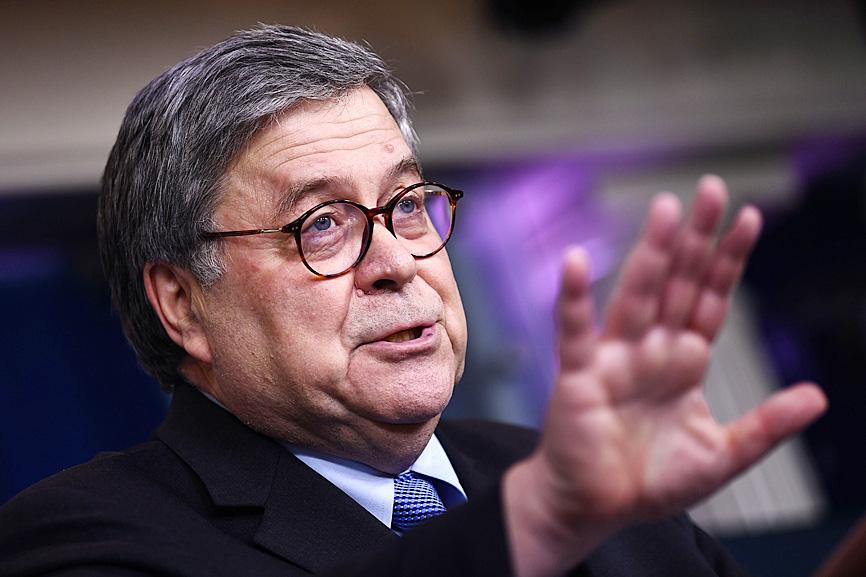US Attorney General William Barr on Thursday assailed Walt Disney Co and Hollywood studios, accusing them of “kowtowing” to the Chinese Communist Party.
Barr’s allegations are part of a sustained diplomatic and public relations offensive by the administration of US President Donald Trump against Beijing, which Barr accused of engaging in “economic blitzkrieg — an aggressive, orchestrated, whole-of-government, indeed whole-of-society, campaign to seize the commanding heights of the global economy and to surpass the United States as the world’s pre-eminent superpower.”
In a speech in Michigan, Barr railed against US corporate leaders who he accused of abetting China’s hegemonic aims, particularly in the movie industry.

Photo: AFP
He said Disney had initially resisted Chinese pressure not to make the 1997 movie Kundun, about the Dalai Lama and Beijing’s annexation of Tibet.
“But that moment of courage wouldn’t last long,” Barr said.
China banned Disney’s movies, leading to an apology from the company for making Kundun.
The management then lobbied China to build a Disneyland in Shanghai, allowing Chinese officials to have a role in running the theme park.
Barr said that the officials “display hammer-and-sickle insignia at their desks and attend party lectures during business hours.”
“If Disney and other American corporations continue to bow to Beijing, they risk undermining both their own future competitiveness and prosperity, as well as the classical liberal order that has allowed them to thrive,” Barr said.
Barr also criticized Hollywood studios for bowing to pressure to tweak scripts in return for Chinese distribution, citing two cases in which the nationalities of characters were allegedly changed.
Beijing objected to a virus in a zombie apocalypse film, World War Z, being shown as originating in China, while a mystic character, the “Ancient One” in the fantasy movie Dr Strange was changed from being Tibetan to Celtic, to avoid upsetting China, Barr said.
He also criticized US technology companies — including Alphabet Inc’s Google, Microsoft Corp, Yahoo Inc, Apple Inc and Cisco Systems Inc — calling them “pawns of Chinese influence.”
“All too often, for the sake of short-term profits, American companies have succumbed to that influence — even at the expense of freedom and openness in the United States,” Barr said.
Cisco rejected Barr’s allegation that it had helped build the “Great Firewall of China,” which Barr referred to as the world’s “most sophisticated system for Internet surveillance and censorship.”
The company “builds its products to global standards, and Cisco does not supply equipment to China that is customized in any way to facilitate blocking of access or surveillance of users,” Cisco said in a statement to the Guardian. “The products we supply to China are the same we provide worldwide, and we comply fully with all export control rules applicable to China including those related to human rights.”

The US government has signed defense cooperation agreements with Japan and the Philippines to boost the deterrence capabilities of countries in the first island chain, a report by the National Security Bureau (NSB) showed. The main countries on the first island chain include the two nations and Taiwan. The bureau is to present the report at a meeting of the legislature’s Foreign Affairs and National Defense Committee tomorrow. The US military has deployed Typhon missile systems to Japan’s Yamaguchi Prefecture and Zambales province in the Philippines during their joint military exercises. It has also installed NMESIS anti-ship systems in Japan’s Okinawa

‘WIN-WIN’: The Philippines, and central and eastern European countries are important potential drone cooperation partners, Minister of Foreign Affairs Lin Chia-lung said Minister of Foreign Affairs Lin Chia-lung (林佳龍) in an interview published yesterday confirmed that there are joint ventures between Taiwan and Poland in the drone industry. Lin made the remark in an exclusive interview with the Chinese-language Liberty Times (the Taipei Times’ sister paper). The government-backed Taiwan Excellence Drone International Business Opportunities Alliance and the Polish Chamber of Unmanned Systems on Wednesday last week signed a memorandum of understanding in Poland to develop a “non-China” supply chain for drones and work together on key technologies. Asked if Taiwan prioritized Poland among central and eastern European countries in drone collaboration, Lin

Renewed border fighting between Thailand and Cambodia showed no signs of abating yesterday, leaving hundreds of thousands of displaced people in both countries living in strained conditions as more flooded into temporary shelters. Reporters on the Thai side of the border heard sounds of outgoing, indirect fire yesterday. About 400,000 people have been evacuated from affected areas in Thailand and about 700 schools closed while fighting was ongoing in four border provinces, said Thai Rear Admiral Surasant Kongsiri, a spokesman for the military. Cambodia evacuated more than 127,000 villagers and closed hundreds of schools, the Thai Ministry of Defense said. Thailand’s military announced that

CABINET APPROVAL: People seeking assisted reproduction must be assessed to determine whether they would be adequate parents, the planned changes say Proposed amendments to the Assisted Reproduction Act (人工生殖法) advanced yesterday by the Executive Yuan would grant married lesbian couples and single women access to legal assisted reproductive services. The proposed revisions are “based on the fundamental principle of respecting women’s reproductive autonomy,” Cabinet spokesperson Michelle Lee (李慧芝) quoted Vice Premier Cheng Li-chiun (鄭麗君), who presided over a Cabinet meeting earlier yesterday, as saying at the briefing. The draft amendment would be submitted to the legislature for review. The Ministry of Health and Welfare, which proposed the amendments, said that experts on children’s rights, gender equality, law and medicine attended cross-disciplinary meetings, adding that